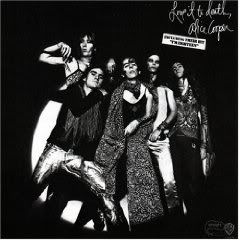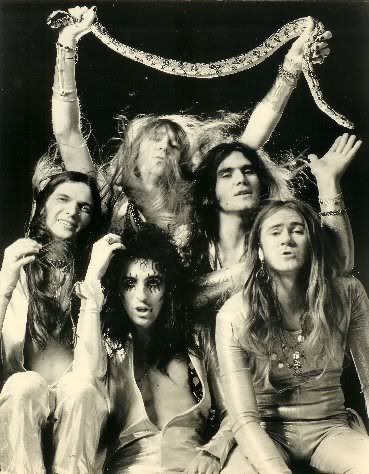Producer Bob Ezrin On ALICE COOPER's Success - "As Far As I Was Concerned This Was More Than Music - This Was The Beginning Of A Cultural Movement"
June 1, 2009, 15 years ago
Larry LeBlanc - former Canadian bureau chief for Billboard from 1991-2007 - spoke with legendary producer Bob Ezrin (PINK FLOYD, ALICE COOPER, KISS) for the weekly LeBlanc Newsletter. A few excerpts follow:
LeBlanc: Was working with Alice Cooper your 'high school' as a producer?
Ezrin: "Oh, it was my grade school. It was kindergarten. Talk about jumping into the deep end. I saw them in New York and I felt that there was something there we had to do. I came back to Toronto selling to save my life and theirs. Jack finally said, 'Enough already. If you like them so much, you do it.' I said, 'I’ll do it' with all of the bravado of a 19 or 20 year old. I leapt into it without any knowledge of how to do it. I’d done a few sessions with Jack. Just a few. I had been in the studio about five or six times, mostly on the other side of the glass, playing. Not really understanding the technology or the producer’s role."
LeBlanc: The only thing you had to go on with how Alice Cooper sounded was their two Straight Record albums Pretties For You (1968) and Easy Action (1970) which we were pretty tame.
Ezrin: "Honestly, I listened only to a small amount of those albums and ignored them from that point on."
LeBlanc: You recorded Love It To Death at RCA’s Mid American Studios in Chicago where Jack Richardson had recorded THE GUESS WHO. You couldn’t record Alice Cooper in Toronto?
Ezrin: "I’m sure we could of but we were dealing with an American band too with five members and the road crew and so on. They were living in Pontiac, Michigan. To get them all the way up to Toronto and to get them across the border, especially with the way that they looked would have been difficult. It wasn’t trivial."
LeBlanc: Did Alice Cooper’s success at both AM and FM radio surprise you?
Ezrin: "Ezrin: "I wasn’t at all surprised. As far as I was concerned this was more than music. This was the beginning of a cultural movement. I wasn’t thinking of it in terms of (radio) frequency bands. I was thinking of it simply in terms of a segment of society, meaning kids and that I felt being one of them, that this was what was happening. Which was that we were adopting a more fantastical approach to our entertainment. We were beginning to embrace experimentation with the stretching of boundaries and the bending of norms. We were doing it politically already. We were kind of doing it lyrically in our music, but we hadn’t touched on things like how we dressed or what our sexual orientation was through our music."
LeBlanc: The Alice Cooper albums are ambitious for their time. You did string arrangements for them, for example
Ezrin: "I learned on Warner Brothers’ dime. I decided that there just was nothing that couldn’t be done. it was that blissful ignorance of youth. So I was I able to roll forward and do things that shouldn’t or couldn’t be done, that were technically improper and upside down. But they suited the situation and captured what we needed to capture at the time. You listen back to it now and it’s pretty primitive stuff. But it was appropriately primitive. That is who they were then."
LeBlanc: The original Alice Cooper wasn’t that good of a band. They were good but not great.
Ezrin: "No but they weren’t that bad either. They were a lot better than they thought. It was a matter of them learning the discipline of recording, rehearsing material, really poring through it to make sure that what they were doing was working with the other members of the band and jettisoning stuff that was unnecessary. These were things that they had never thought about. You just get together and everybody plays and it just kind of works. Except in most times, it just doesn’t. You really have to do think these things through. I brought that sensibility to the group."
The LeBlanc Newsletter is exclusively carried and archived by Canadian Music Week in Canada and CelebrityAccess and their online ezine Encore in the US. For more info and to subscribe visit www.celebrityaccess.com/encore.














